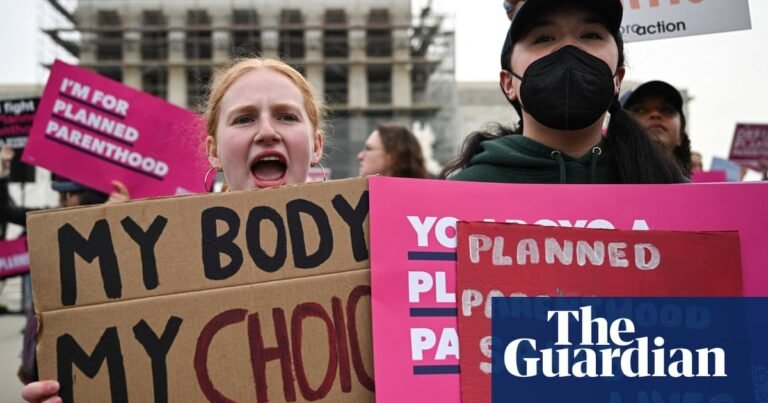Planned Parenthood sued the Trump administration on Monday over a provision in Donald Trump’s sweeping domestic policy bill that would strip funding from health centers operated by the reproductive healthcare and abortion provider.
In a complaint filed in Boston federal court, Planned Parenthood said the provision is unconstitutional, and its clear purpose is to prevent its nearly 600 health centers from receiving Medicaid reimbursements.
Planned Parenthood said that would have “catastrophic consequences”, given that the health centers serve more than 1 million patients annually through Medicaid, the US government’s insurance program for low-income people. More than 80 million people use Medicaid.
“The true design of the Defund Provision is simply to express disapproval of, attack, and punish Planned Parenthood, which plays a particularly prominent role in the public debate over abortion,” Planned Parenthood said in its lawsuit.
The lawsuit continued: “Stripping away this patient volume and reimbursements for care provided will result in the elimination of services, laying off staff and health center closures. The public health consequences for Medicaid patients and non-Medicaid patients alike will be dire and compounding.”
The organization has estimated that the defunding could force roughly 200 Planned Parenthood clinics to shutter. Blue states, which are home to more people on Medicaid, would probably see a disproportionate number of closures.
Since it is illegal to use Medicaid to pay for most abortions, Planned Parenthood clinics rely on the insurance program to reimburse them for providing services like birth control, STI tests and cancer screenings. But if blue-state clinics are forced to close, people will no longer be able to seek abortions at those clinics – a possibility that has led some abortion rights supporters, including Planned Parenthood, to call the Trump bill’s provision a “backdoor abortion ban”. Planned Parenthood provides an estimated 38% of US abortions.
“We’re facing a reality of the impact on shutting down almost half of abortion-providing health centers,” Alexis McGill Johnson, Planned Parenthood Federation of Americas’s CEO, told the Guardian last week. “It does feel existential. Not just for Planned Parenthood, but for communities that are relying on access to this care.”
Planned Parenthood’s lawsuit asks the courts to declare the Trump bill’s provision unconstitutional on numerous grounds, or to at least preserve Medicaid funding for Planned Parenthood clinics that do not provide abortions. The reproductive health giant suggests in the lawsuit that Congress did not understand its structure when it passed the provision. The Planned Parenthood technically consists of a mothership group, Planned Parenthood Federation of America, and nearly 50 regional affiliate groups that operate as independent entities.
Medicaid is overseen by the Centers for Medicare & Medicaid Services, part of the US Department of Health and Human Services. That agency did not immediately respond to requests for comment.
Planned Parenthood is being buffeted by intense financial headwinds. This spring, the Trump administration froze tens of millions of dollars earmarked for family planning providers who participate in Title X, the nation’s largest family planning program. Although several of those providers have since had their funding restored, a Planned Parenthood spokesperson said last week their affiliates had not received funding.
The US supreme court also ruled in late June in favor of South Carolina in a case involving the state’s attempt to kick Planned Parenthood out of its state Medicaid reimbursement program. Red states may see that ruling as a blessing to their own efforts to defund Planned Parenthood.
Even if Planned Parenthood’s Monday lawsuit succeeds, the organization will probably have to grapple with the consequences of that supreme court ruling for years to come.
